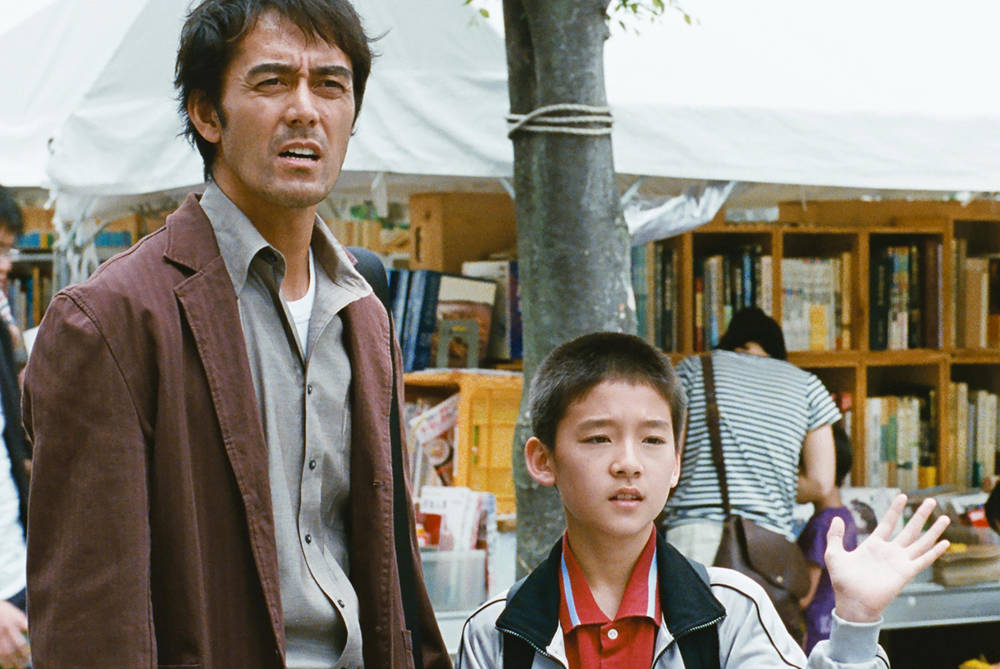Sometimes a storm is just a storm. But this is rarely true in movies. If clouds gather on the horizon, it’s usually an omen about relationship troubles or a giant monster approaching, or possibly a twister leading the way to the land of Oz. Instead of trying to disguise the significance of the storm in After the Storm, director Hirokazu Kore-eda embraces it. For a filmmaker known as a subtle storyteller, this is downright heavy-handed. But if this film isn’t Kore-eda at his best—see Our Little Sister and Nobody Knows for that—the experience of watching it is frequently wonderful. Kore-eda has gotten to the point where even when his work isn’t top-drawer, it’s exceptionally nice to be around.
In After the Storm, he accomplishes this with a difficult-to-love protagonist: Ryota, a divorced father perpetually short of money. He wrote a novel some years ago, but has been unable to follow its modest success; now he’s working for a detective agency, ostensibly as research for another book, although this excuse seems unlikely. He stupidly gambles away his earnings, which is why he’s at the point of rummaging through his recently deceased father’s stuff for something to pawn. In his dumpy little apartment, one shelf is occupied by copies of his lone literary outing, like a reminder of unfulfilled promise. Kore-eda wrote the part for Hiroshi Abe (who starred in Kore-eda’s Still Walking), a Gregory Peck type who towers over the other actors; Abe brings the role just the right amount of rumpled sad-sack funk. You can see him wince when he talks to people, as though every encounter were a reminder of how far short of expectations he’s fallen.
In the movie’s first half—you know, before the storm—we watch Ryota’s struggles, and also meet his ex-wife Kyoko (Yoko Maki) and their son. But in many ways the picture is dominated by Ryota’s warmhearted mother (Kirin Kiki), a widow whose cluttered apartment becomes home base for the film’s second half. This small space is a staging area for sifting through family issues, especially when the four main characters get trapped there for a night by the passing typhoon. Kore-eda uses a particularly claustrophobic visual approach to these scenes—the shots look like they lack the usual few inches of breathing room at the edges of the screen, as though to emphasize how tossed-together everybody is. It gives these scenes a Hitchcockian air, except there are no dead bodies piling up. Just hurt feelings and tender hopes.
The sorting-out of this situation doesn’t carry many surprises—part of the reason After the Storm is minor compared to Kore-eda’s recent run. Once Ryota establishes his childhood memories of a particular playground near the apartment, we can assume that he and his son will find their way there, storm or no storm. By contrast, in Our Little Sister—one of my favorite movies of recent years—the surprise was that every time an element got introduced as a possible melodramatic device, Kore-eda steered in the other direction, preferring to operate in a gentle flow. I don’t remember any storms in it.
After the Storm is small, but it isn’t soft. Look at the precision of the minor characters, for instance: the peppery detective-agency boss (Lily Franky), or Ryota’s gumshoe partner (Sosuke Ikematsu), a cheerful sort who sees Ryota’s problems but supports his friend anyway. These microscopic observations are enough to keep this film engrossing and bittersweet. Anyway, there are enough large, shiny objects in movie theaters this summer. If After the Storm never becomes larger than the sum of its parts, its parts are nevertheless beautifully made. After the Storm, Not rated. Opens Fri., June 23 at SIFF Cinema Uptown.
film@seattleweekly.com






